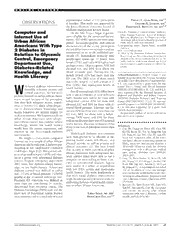
Computer and Internet Use of Urban African Americans With Type 2 Diabetes in Relation to Glycemic Control, Emergency Department Use, Diabetes-Related Knowledge, and Health Literacy. PDF
Preview Computer and Internet Use of Urban African Americans With Type 2 Diabetes in Relation to Glycemic Control, Emergency Department Use, Diabetes-Related Knowledge, and Health Literacy.
O N L I N E L E T T E R S OBSERVATIONS representative subset of 112 participants TIFFANYL.GARY-WEBB,PHD1,2 at baseline. This study was approved by CHANDRAL.JACKSON,MSC2 the Johns Hopkins University School of FREDERICKL.BRANCATI,MD,MHS1,2 MedicineInstitutionalReviewBoard. Computer and Of the 542 Project Sugar 2 partici- From the 1Division of General Internal Medicine, Johns Hopkins University School of Medicine, Internet Use of pants eligible for the computer/Internet Baltimore,Maryland;andthe2DepartmentofEp- Urban African survey,457(84%)interviewswerecom- idemiology,JohnsHopkinsBloombergSchoolof pleted. Sociodemographic and clinical PublicHealth,Baltimore,Maryland. Americans With Type characteristics of the survey participants Corresponding author: Lipika Samal, lsamal1@ jhmi.edu. 2 Diabetes in didnotdifferfromnonrespondersandare DOI:10.2337/dc09-1416 summarized in an article published pre- Relation to Glycemic © 2010 by the American Diabetes Association. viously (3). Respondents primarily were Readersmayusethisarticleaslongastheworkis Control, Emergency middle-aged (mean age 57 years), were properlycited,theuseiseducationalandnotfor Department Use, female(73%),andhada60%highschool profit, and the work is not altered. See http:// creativecommons.org/licenses/by-nc-nd/3.0/ for graduationrate.Ofparticipants,53%had Diabetes-Related details. elevated A1C and 65% were above the Knowledge, and blood pressure goal. During the 24- Health Literacy month period, 22% had more than one Acknowledgments—Project Sugar 2 was ED visit. The DKN score of those tested fundedbygrantsfromtheNationalInstitutes ofHealth(NIH)(R01-DK48117andR00052). wasintherange0–12withameanof5. L.S. was supported by a grant from the Na- Web-based diabetes interventions Few (18%) had inadequate levels of tional Heart, Lung, and Blood Institute healthliteracy. favorably influence process and (NHLBI)(T32HP10025).H.-C.Y.andF.L.B. Forallrespondents,82%eitherknew clinicaloutcomes,butfewstud- were supported by the National Institute of ieshavefocusedonurbanAfricanAmer- howtouseacomputerorwerewillingto Diabetes and Digestive and Kidney Diseases icans, in part because of the perception learn.Resultsweresimilarforthosewith (NIDDK) Diabetes Research and Training suboptimal control: 85% for those with Center(P60DK079637).T.L.G.-W.wassup- that they lack adequate access, experi- elevatedA1Cand80%forthosewithel- portedbyagrantfromNHLBI(K01HL084700). ence,orinterest(1).Black-whitedispari- evated blood pressure. Likewise, the fig- F.L.B. was also supported by a grant from ties in diabetes-related knowledge and urewas80%forthosewithmorethanone NIDDK(K24DK62222). health behaviors are natural targets for Nopotentialconflictsofinterestrelevantto ED visit, 88% for those with a below- suchinterventions.Wehypothesizedthat thisarticlewerereported. average DKN score, and 83% for those urban African Americans with subopti- withaninadequateshorttestoffunctional maldiabetescontrol,lowdiabetes-related ● ● ● ● ● ● ● ● ● ● ● ● ● ● ● ● ● ● ● ● ● ● ● healthliteracy.Themainlimitationofthis knowledge, and/or low health literacy References studyisthelackofdatamorerecentthan would have the access, experience, and 1. ChoJH,ChangSA,KwonHS,ChoiYH, 2004. interest to use Web-based diabetes KoSH,MoonSD,YooSJ,SongKH,Son Web-based diabetes interventions interventions. HS,KimHS,LeeWC,ChaBY,SonHY, have been proven to be effective at im- Wesoughttocharacterizecomputer/ Yoon KH. Long-term effect of the Inter- InternetuseinasampleofurbanAfrican proving health status, self-efficacy, and net-based glucose monitoring system on physical activity, as well as process and HbA reduction and glucose stability: a Americanadultswithtype2diabetespar- 1c clinical outcomes (1). We have found 30-month follow-up study for diabetes ticipating in the randomized controlled that,asearlyas2004,over80%ofurban management with a ubiquitous medical trialProjectSugar2(2).Wequeriedsub- African Americans with suboptimal dia- care system. Diabetes Care 2006;29: jectsongeneralcomputerskillsandinter- betes control either knew how to use a 2625–2631 est in a group with suboptimal diabetes 2. Gary TL, Batts-Turner M, Bone LR, Yeh computer or were willing to learn. Con- control, frequent emergency department HC,WangNY,Hill-BriggsF,LevineDM, trary to conventional wisdom, figures (ED) visits, low diabetes-related knowl- Powe NR, Hill MN, Saudek C, McGuire were similar in a subset of respondents edge, or low health literacy. Suboptimal M,BrancatiFL.Arandomizedcontrolled with low DKN scores and inadequate diabetes control was defined as either trialoftheeffectsofnursecasemanager A1C(cid:1)7.0%orbloodpressure(cid:1)130/80 health literacy. The main implication is andcommunityhealthworkerteaminter- that Web-based diabetes interventions ventionsinurbanAfrican-Americanswith mmHg at the 24-month follow-up visit. mightbeunexpectedlyattractivetoolsfor type2diabetes.ControlClinTrials2004; Frequent ED visitation was defined as addressingdiabetes-relatedhealthdispar- 25:53–66 more than one visit during 24 months, itiesinurbanAfricanAmericans. 3. Jackson CL, Batts-Turner ML, Falb MD, determined from insurance claims. The YehHC,BrancatiFL,GaryTL.Computer DiabetesKnowledge(DKN)scaleandthe and internet use among urban African short test of functional health literacy LIPIKASAMAL,MD,MPH1 Americanswithtype2diabetes.JUrban wereadministeredtoarandomlyselected HSIN-CHIEHYEH,PHD1,2 Health2005;82:575–583 care.diabetesjournals.org DIABETESCARE,VOLUME33,NUMBER1,JANUARY2010 e9
